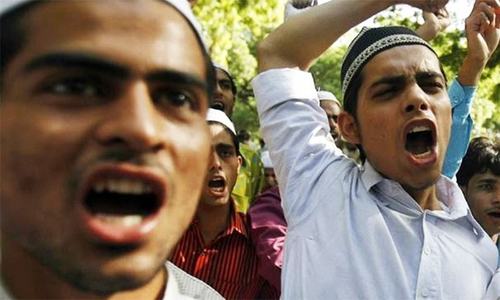
EVER since the Jan Sangh was set up in 1951, one of its main aims was to wipe out Muslim law and enforce a uniform civil code. After its reincarnation in 1980 as the Bharatiya Janata Party (BJP), this demand became one of its emblems.
Once he became prime minister, Narendra Modi made Muslim personal law embodied in the Sharia a target of his campaign. He picked on the one feature that many Muslims themselves were moving towards reforming because they saw it as contrary to religious injunctions— the triple talaq. His concern for Muslim women’s welfare was not very evident when, as Gujarat’s chief minister in 2002, they were raped and murdered on his watch. Now he and his henchmen are posing as their liberators.
Explore: India's new 'enemy property' law unfairly targets Muslims, say analysts
Last year, Modi said, “Getting Muslim women their rights as per the constitution is the responsibility of the government and society,” moaning, “what is the crime of my Muslim sisters when someone says talaq thrice over the phone and her life is destroyed?” Shortly after, BJP president Amit Shah said that a uniform civil code will be “an agenda in the UP Assembly elections”.
Read: Should India's Muslims keep away from electoral politics?
Modi is exploiting an issue that Muslims are already looking into.
As far back as December 1995, the leftist All India Democratic Women’s Association stated, “This convention condemns the propaganda of the BJP for an immediate uniform civil code which is directed against the Muslim community. It protests against its hypocritical claim that it is motivated by concern for women’s rights, in this case, Muslim women. It is this very political platform which in its earlier incarnation as the Hindu Mahasabha and the Jana Sangh had led the opposition to any reform in Hindu laws, leading to an opportunist compromise at the cost of women’s equality.”
The BJP is out to exploit a problem already on the verge of a solution. Speaking in the Central Legislative Assembly in 1925, Quaid-i-Azam Mohammad Ali Jinnah said, “I have no hesitation in saying that the Privy Council have on several occasions absolutely murdered Hindu law and slaughtered [Muslim] law.” He himself had won his spurs in public life by securing the passage of the Mussalman Waqf Validation Act, 1913, which nullified a Privy Council ruling in 1894 on waqf-alul-awlads that would have ruined many Muslim families.
In 1897, the Privy Council made it clear that it preferred commentaries of doubtful accuracy to the Quranic text. It chose to rely on the dicta in the Hedaya, translated by Hamilton, and N.E. Baillie’s Digest of Muhammadan Law. Two of the greatest Muslim judges, Justices Ameer Ali and Syed Mahmud (son of Sir Syed Ahmad Khan) had exposed the errors in the translations.
After independence, Pakistan’s Supreme Court discarded this legacy. It ruled that it was the duty of the courts to ascertain the law from the Quran and the hadith for themselves in preference to the opinions of British-era commentators.
But the Muslims of India did not shed the sham doctrines of the Privy Council. Some high courts’ judges departed from the beaten path and believed that the existing Muslim law on divorce had no sanction in the Quran. Justice V.R. Krishna Iyer of the Kerala High Court, who rose to become an Indian Supreme Court justice, said as far back as in 1970 that “a deeper study of the subject discloses a surprisingly rational, realistic and modern law of divorce”.
The Quran enjoins a clear procedure. The first step is appointment of arbiters “if you fear a breach” between the couple (4:35). Failing their efforts, either side can demand divorce; khula by the wife and talaq by the husband, for which a period of three months (iddah) is obligatory. It is revocable before that.
In 1943, Maulana Abul Ala Maududi said, “Due to want of knowledge, Muslims have been generally given to understand that a talaq can be pronounced only through the triple-divorce formula, although it is an innovation and a sin leading to many legal complications. If people knew that triple divorce is superfluous and even a single talaq would dissolve the marriage, of course, leaving room for revocation during the next three months (iddah) and remarriage thereafter, innumerable families could have been saved from disruption.”
Section 7 of the Pakistan’s Muslim Family Laws Ordinance, 1961 establishes an arbitration council, and mandates conciliation and a 90-day interim before a divorce is affected. Sadly, the organisations that profess to represent India’s Muslims on this issue studiously ignore this law — and thus play into the hands of the BJP, defying Muslim women’s bodies that are committed to the Sharia but that want the triple talaq to go.
The writer is an author and a lawyer based in Mumbai.
Published in Dawn, May 20th, 2017













































